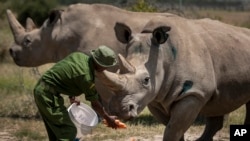Samuel Mutisya, head of research and species at the Ol Pejeta Conservancy in central Kenya, says his team used 29 eggs taken from one of the two aging white rhino females that remain in the conservancy.
He says his team aimed to fuse the eggs with saved northern white rhino sperm to create a pure embryo, a process which has been challenging.
The two remaining female white rhinos at the conservancy — Najin and her offspring Fatu — cannot carry a pregnancy due to their age. Najin was born in 1989; Fatu was born in 2000.
Back in 2021, scientists decided to stop using Najin's eggs in the breeding program due to her age and health.
The two male rhinos in the conservancy both died. The last one, known as Sudan, died in 2018.
Northern white rhinos roamed freely in the Central African Republic, Chad, the Democratic Republic of Congo, and Sudan for centuries. But years of conflict and poaching for their horns have led to their near extinction.
Philip Muruthi, vice president of conservation science and planning at the African Wildlife Foundation, says the conservationists have not given up on saving the northern white rhinos from extinction.
"Well, it is not very common to do it for a large mammal, so it's still an experiment. There are chances of success, but there are also chances of failure. But we haven't lost," Muruthi said.
"As conservationists, we should not lose hope on a species. Very expensive, but chances of success may be there," he added. "Species can be recovered from extinction, from near extinction. I'm concerned, of course, that some people say it is too costly. But for me, I would say that let the efforts be put in place. This species was there and had functions beyond just being seen. It has ecosystem services functions."
Eggs collected from the animals are flown to Italy for maturation and fertilization. Scientists hope to implant the eggs into a surrogate southern white rhino female.
Mutisya says the southern white rhino will not necessarily transmit any genetic material.
